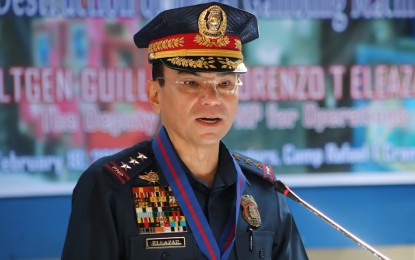
PNP deputy chief for operations, Lt. Gen. Guillermo Eleazar. (File photo)
MANILA – Protecting the right to life is the main reason for the government's implementation of measures to contain the spread of the coronavirus disease 2019 (Covid-19), a ranking official of the Philippine National Police (PNP) said Saturday.
"Isipin natin ang karapatang mabuhay [What we should think of is the right to life] Just like what (Interior) Sec. Eduardo Año said we need to stop the spread of the virus. That’s why we have come up with all these guidelines. But we are working on a condition that is not absolute," said Lt. Gen. Guillermo Eleazar, PNP deputy chief for operations, in a press briefing on the sidelines of the meeting of the Metro Manila Council (MMC) on community quarantine measures.
Eleazar dismissed criticisms that the planned community quarantine and enforcement of curfew hours are against basic human rights.
"That’s why we request you to not try to circumvent this. We need your full cooperation. If you’re not working, if you’re not health or emergency workers, stay at home so that we can put an end to this," Eleazar said.
The whole region will be on a month-long community quarantine as the government steps up its efforts to curb the spread of the dreaded disease.
Under the order, land, domestic air and sea travel to and from Metro Manila are temporarily prohibited with certain exemptions.
He said that only people allowed to enter and exit the region are employees working in Metro Manila, health and emergency workers, among others.
Non-essential entry and exits such as visiting their loved ones and other matters would not be allowed, Eleazar said.
Eleazar said that checkpoints would also be implemented within Metro Manila.
"We will advise the local police to coordinate with the LGUs," he said.
Consequently, Eleazar urged people to limit their movement and stay at home.
No 'martial law'
Meanwhile, Justice Secretary Menardo Guevarra urged the public to continue cooperating with authorities and the emergency procedures undertaken by the government amid the Covid-19 threat, stressing that these measures should not be perceived as martial law.
"(W)e are not in a state of martial law. we are fighting a common but relatively unknown enemy, a dangerous and lethal virus known as Covid-19," Guevarra said in a statement.
Guevarra said the PNP, assisted by the Armed Forces of the Philippines (AFP) "will be on the streets not to sow fear but to protect us".
"This is a phenomenon that is happening not only in our country but also elsewhere around the world. By standing united and fighting together, we shall beat this enemy," he said.
Documents required upon entering Metro
Año said that the police and military will check the documents of the people entering the borders of Metro Manila.
People may present the following: identification cards, a certificate from barangay where someone is working, business permits, pictures of business establishments, among others.
"Kailangan talaga may documentation kung wala, sorry [Documentation is needed, if you don't have, sorry]," Año told reporters in a press briefing.
He asked for the public’s full cooperation as the national government-imposed community quarantined aimed at containing the coronavirus disease 2019 (Covid-19) takes effect Sunday.
“We are in a different situation. We need coordination, cooperation,” Año said.
In the meeting, all 17 mayors from the cities and municipalities comprising the National Capital Region (NCR), backed by the DILG and PNP, agreed to implement a curfew from 8 p.m. to 5.a.m from Sunday (March 15) until April 14.
Anyone found loitering during curfew hours would be questioned and asked to go home. Those who would show resistance risk facing arrest.
However, he said there will be exemptions to “essential movements” such as those whose residences are outside the region but work in Metro Manila, medical workers and first responders, food delivery personnel, and grocery/supermarket employees.
“You’re exempted from the curfew if you’re coming from work if you need to buy medicines or food. Other than that, stay home,” he stressed. It is also up to the local government units to impose community quarantine in such case (where) no one is allowed to go out of their houses except for essential travel,” he added. (with reports from Benjamin Pulta/PNA)
